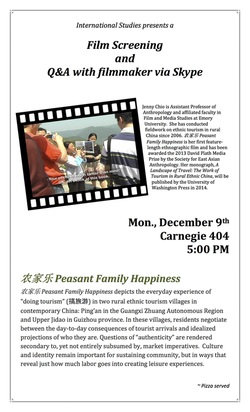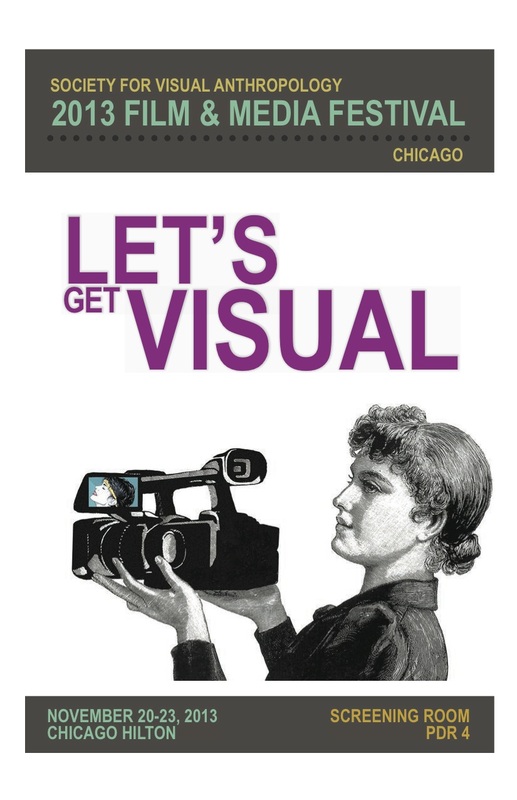|
I'm really excited that my film, 农家乐 Peasant Family Happiness, was awarded the 2013 David Plath Media Prize, given by the Society for East Asian Anthropology [SEAA]. The prize was presented during the 2013 SEAA Business Meeting, during the AAA Annual Meetings in Chicago.
According to the SEAA, this award goes to "the best work (film, video, audio, and multimedia) on any aspect of East Asian anthropology and/or East Asian anthropology's contribution to the broader field." It's a huge honor to have my film recognized by the section, and hopefully this will encourage more anthropologists to consider the possibilities of film and video making in anthropological research. The 2013 committee wrote of my film: This documentary explores the backstage efforts of locals in the world of ethnic tourism. Chio observes and documents interactions between locals and tourists with a focused yet easy rapport with members of local communities. A variety of perspectives, views and experiences are presented with appreciation for the dilemmas faced by individuals and groups who seek more stable income, material comfort and dignified living in ancestral villages. These concerns are situated against a backdrop of increased surplus disposable income and leisure time among China’s middle class....A kinder, gentler version of Dennis O’Rourke’s acerbic Cannibal Tours, Chio’s film shows how residents negotiate with visiting Han tourists and their idealized projections of ethnic minorities. And now that this film finally feels like it is "done," I need to start thinking about what new projects are in store for me...  农家乐 Peasant Family Happiness was screened at Macalester College, in Minneapolis, on Monday, December 9, 2013. Unfortunately I can't be there in person, but I held a Q&A session via Skype after the film. The screening was organized by Professor Zeynep Gursel in International Studies, and it was really great to hear what the Macalester students thought of my film and the conditions of ethnic tourism in rural China. 112th American Anthropological Association Annual Meeting, Chicago, November 2013
I gave a paper titled "Precarity Alleviation: Tourism as Development in Rural, Ethnic China" as part of the invited session "Precarious Time: Discussions on the Un/Doing of East Asia," on Saturday, November 23. Check out this short post about the session on the Anthropology News blog: http://www.anthropology-news.org/index.php/2014/02/20/aaa-2013-invited-session-spotlight/ Paper abstract: In 2009, the World Bank approved a US$60 million loan for a project titled “Cultural and Natural Heritage Protection and Development Project” in Guizhou province, China. Consultations and initial master planning for this project had begun nearly ten years earlier. This paper examines the unfolding of tourism as development in the village of Upper Jidao, one selected site within the project, from the perspective of those whose present conditions and future ambitions are most at stake: village residents. The oft-expressed intent of utilizing tourism as development in China is to alleviate the economic precariousness of rural livelihoods, particularly in ethnic minority regions, by creating new forms of labor and wage-earning in the booming national tourism industry. Likewise, such projects to protect heritage aim to stabilize the perceived precariousness of ethnic traditions and folk practices by rendering cultural differences into commercially entertaining, pleasantly familiar forms. And yet, at the most local levels of intra-village socialities and individual subjectivities, anxieties, uncertainties, and frictions are, in many cases, heightened precisely because of ongoing national, policy-level exhortations for rural, ethnic people to become more developed, more urban, and more modern. Rural, ethnic lives and livelihoods are thus made and un-made in the concomitant processes of tourism, development, and urbanization in China today, reinforcing conditions of social and economic precarity that are both inherent in tourism as development and newly emergent as a consequence of state-led ideological efforts to reimagine the stakes of being rural and being ethnic in contemporary China. This year I've been lucky enough to co-organize the 2013 SVA Film and Media Festival, which runs concurrently with the American Anthropological Association Annual Meeting in Chicago. We've got an amazing line-up of films, from ultra shorts to feature length, and a number of the filmmakers will be present for post-screening Q&A.
The program is available to download here. |
Archives
April 2024
|
